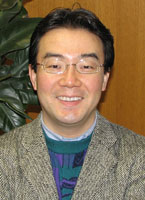Shin-ichiro Imai, MD, PhD

Shin-ichiro Imai, MD, PhD, is assistant professor of medicine and of developmental biology at Washington University School of Medicine. He is known for his contributions to understanding the biology of aging.
Imai earned his medical degree in 1989 and his doctorate in preventive medicine in 1995 from Keio University School of Medicine, Tokyo, Japan. From 1993 to 1997, he was an instructor in microbiology at the same university. He accepted a postdoctoral fellowship in biology at Massachusetts Institute of Technology in Cambridge in 1997 and became a postdoctoral associate there in 1999. In 2001, Imai took a position as assistant professor of molecular biology and pharmacology at Washington University School of Medicine.
Imai’s research focuses on the cellular and physiological functions of the sirtuin proteins — enzymes that Imai previously discovered to be keys to aging and longevity. Sirtuins form a critical link between metabolic status and longevity by responding to the level of energy available within the body’s cells. Imai demonstrated that the mammalian form of the enzyme regulates insulin secretion in the pancreas and that increasing the amount of the enzyme improved glucose tolerance in mice. This work suggests a novel therapeutic approach to the treatment of type 2 diabetes. Further investigation by Imai showed that the body’s fat cells also influence pancreatic insulin secretion through a novel process involving a new metabolite in blood circulation and sirtuins.
Imai serves as editor of the journal Aging Cell. He is a member of the American Diabetes Association and has received innovation awards and research support from the American Diabetes Association and the Juvenile Diabetes Research Foundation. He also has received the Ellison Medical Foundation New Scholar Award in Aging, the Glenn Award for Research in Biological Mechanisms of Aging, and the American Society for Cell Biology/Glenn Foundation Award.




